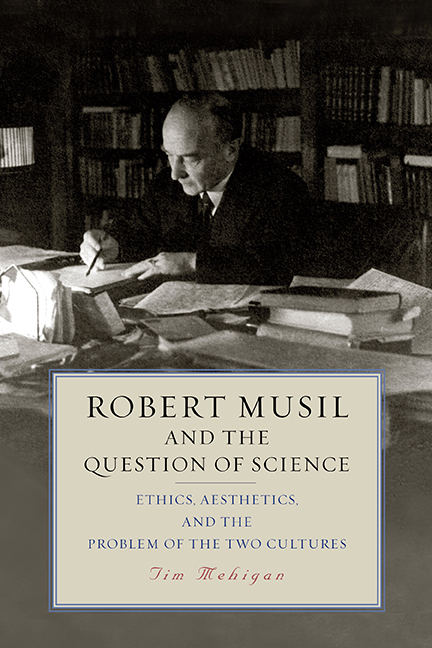Book contents
- Frontmatter
- Contents
- Preface
- Introduction: Musil’s Intellectual Position
- Part I Musil and the Two Cultures
- Part II Aesthetics and Ethics in the Context of the Two Cultures
- Conclusion: “A General Secretariat of Precision and Soul”: Ethics, Knowledge, and Literature after the Fourth Revolution 149
- References
- Index
1 - The Question of Science
Published online by Cambridge University Press: 26 April 2020
- Frontmatter
- Contents
- Preface
- Introduction: Musil’s Intellectual Position
- Part I Musil and the Two Cultures
- Part II Aesthetics and Ethics in the Context of the Two Cultures
- Conclusion: “A General Secretariat of Precision and Soul”: Ethics, Knowledge, and Literature after the Fourth Revolution 149
- References
- Index
Summary
ACCORDING TO THE noted literary critic James Wood, the novelist is always working with at least three different languages. These, he explains, are, first, “the author's own language, style, perceptual equipment, and so on”; second, “the character's presumed language, style, perceptual equipment”; and, finally, a third species of language Wood calls “the language of the world” (Wood 2008, 28–29). This third species of language is of an inherited type—it is what is already “out there” when novelists make reference to the world. It might be conceived of as the material substrate of fiction, though the author's imagining of it does not make it objective. The language of the world is, rather, a palpable effect of life that insinuates itself into the author's creative imagination. This imagination then renders it usable for the purposes of literature.
For the Austrian writer Robert Musil, whose major works were published in the period 1906 to 1936, the language of the world plays a particularly important role. Musil's last and unfinished major work, The Man Without Qualities, for example, sets out on its long journey of more than a thousand pages published during the author's lifetime and a thousand more from Musil's posthumous papers (which are included in the standard Rowohlt edition of the novel) not just by talking about the weather, which on the day in question is favorable and fairly unremarkable, but also by adducing a rich array of meteorological data. Along with details relating to barometric lows and highs, the description includes references to seasonal temperature differences and monthly fluctuations of temperature, the rising and setting of sun and moon, and the humidity of the air. The opening paragraph concludes with the remark: “In a word, that describes the factual rather well, even if it was also somewhat old-fashioned: it was a fine August day of the year 1913” (GW 1:9). The point of this description is to invite the reader to consider two types of language that have become available when talking about the world: the language of ordinary experience, that is, that which is referenced in the phrase “it was a fine August day,” on the one hand, and the specialist language of science, as instanced by the meteorological data amounting to the same thing, on the other.
Information
- Type
- Chapter
- Information
- Robert Musil and the Question of ScienceEthics, Aesthetics, and the Problem of the Two Cultures, pp. 15 - 31Publisher: Boydell & BrewerPrint publication year: 2020
